Educator Spotlight: Kenya Teacher Helps Students Rise
As Dorcas Kimutia looks around at the tin walls, glass-less windows, and open doors of Lolongbei Primary School, she sees much that still needs to be done. But she also sees the strength, courage, and perseverance of the 250 students that she teaches.
“Our kids are very, very, very hard workers. They perform very well on the national exams for Kenya,” she said in a recent phone interview with Studies Weekly.
Lolongbei Primary School, Kenya

Dorcas Kumutia is a teacher at Lolongbei Primary School in Kenya.
Kimutia is a Grade 4-8 teacher at Lolongbei in Kenya, East Africa. She rents a small room that’s about a 40-minute walk to school. Every day, she’s at the school by 7 a.m. so she can greet the students who start arriving around 7:30 a.m. – many of whom also walk 40-60 minutes to get to school each morning.
During lessons, her students sit at desks that look like half of a picnic table, with a long bench, and board. Usually three to four students share each bench desk. There is no electricity, so teachers partially cover up the open windows with sacks or tarps to keep out the cold, leaving little light for reading.
School runs from 8:20 a.m. to 5:00 p.m. with a break mid-day for the children to walk home for lunch, and then return for afternoon classes. The school has no running water, so students carry bright yellow jugs – about the size of a laundry detergent bottle – to school. Along the way, they must find their own water and gather branches or twigs to use as firewood to heat the school, which is very cold all winter long.
The 290 kids share one latrine (toilet) at Lolongbei.
“Too many times, instead of learning or playing in the field, they are in long queues, waiting to use the latrine,” Kimutia said.
Due to insufficient funding, the school doesn’t serve meals for the students. In December, Studies Weekly donated fortified flour that can be used to make uji, a type of Kenyan porridge. Kimutia said the uji is currently feeding the 60 Pre-Primary children. There is not enough to feed Grades 1-8 at this time, and many of the students come to school hungry, because they have very little food at home.
“It is a challenge for the kids, and for teachers. Many students have nothing in their stomachs and they are weak and fall asleep in class,” Kimutia said.
Kimutia also deals with students who are traumatized by a difficult home life. Despite all this, the students make the long trek each day.
“Our kids love school because they feel safe and they want to be in school,” Kimutia said.
The Power of Education
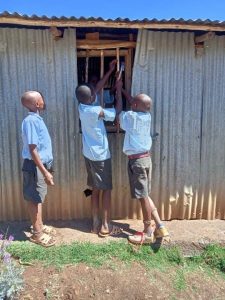
Dorcas Kumutia’s students repair parts of the walls of their school.
Education is very important to both the teachers and students at Lolongbei Primary School. Kimutia grew up as the oldest of five children whose parents were poor farmers.
“My parents never went to school but they struggled very hard to keep me in school,” she said. She has dedicated her life to being a teacher, and her entire focus is on helping her students have a future.
“Our teachers work very hard. Education is so important because this will help the students to become world changers. If they can change the future, they can change the world,” Kimutia said. “It’s such a joy to see my kids have a bright future because they will change our country and our villages, so we can fight vices like corruption and child abuse.”
Kimutia’s dream is to become the best teacher she can for her students. She graduated from college in 2012, and started teaching at an orphanage, where she not only educated the children, but she also helped clean and care for the building and worked in the garden. She then taught at a school for children with special needs, before starting at Lolongbei in 2019.
When she first came to Lolongbei, there were no teachers.
“The kids would come to school and hope for volunteers or well-wishers who would stay for a few weeks and teach them. When no one came, the kids taught themselves,” she explained. They are so eager to learn.
Today there are teachers, but each one still must teach multiple classes. The students stay in their classrooms while the teachers move from class to class giving the lessons on different subjects.
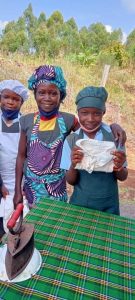
One of Dorcas Kumutia’s students, Deborah, teaches others how to clean their clothes and iron.
Kimutia is particularly proud of one student, Deborah, who is “very self-driven and responsible.” Deborah is the class monitor, and a leader among the Grade 5 students, teaching them how to clean their clothes and iron. Deborah is very artistic and wants to become a doctor.
Another student, Ian, said his best subject is home science, where he is learning how to cook. He hopes to become an engineer.
Still another student, Immanuel, is 17 and in Grade 5. He’s been through a lot of challenges. Too often, students have to drop out of school to earn money for their families. Sometimes, like Immanuel, they are able to come back to school.
“Having kids who are 11 and 17 in the same class, it requires patience,” Kimutia said.
Teachers and students both must have patience daily, because of the lack of so many basic things at the school.
Lack of Resources
Studies Weekly became aware of Kimutia through Debbie Bagley, Studies Weekly Teacher Advocate. Bagley was scrolling through a Facebook teacher group in August 2021, and admiring all the posts from teachers sharing their Back-to-School ideas and pictures of how they were decorating their classrooms. She came across a post from Kimutia, thanking teachers for their ideas, and sharing how she used them to decorate her own classroom.
“She thanked them for sharing how to make classrooms more engaging and welcoming for students, and posted pictures of how she used their ideas,” Bagley said. She’d made handwritten signs for the walls of her Kenya classroom.
“No fancy print-outs, cut-outs, bulletin boards, colorful borders, or curtains. Yet, here she was still thanking them for the ideas she had gained. It was very humbling,” Bagley said.
Bagley reached out to Kimutia, and they began chatting over social media.
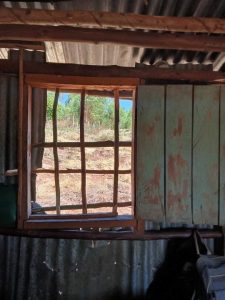
Classrooms at Lolongbei Primary School have windows but no panes. Students gathered sticks to put in the windows to decorate them.
“During our conversations, we talked about her school system and supports, and what it’s like there. It is so very different than it is here – as much as teachers feel unsupported and burdened (and rightly so!) here – there are so many more essential needs where she teaches,” Bagley said.
She wanted to help and thought of sending Kimutia some of her own school supplies. But the shipping cost was astronomical, and there was no guarantee that the materials would actually make it to her. So Bagley started by donating money directly to Kimutia.
“And she was always very careful about what she purchased. Even though I never asked her to verify her purchases, she always sent pictures of her receipts and pictures of her students using the supplies,” Bagley said.
Bagley reached out to others at Studies Weekly, and was excited that the company decided to do even more for the school.
When asked what tools or resources Kimutia wished that her students had access to, she first mentioned a single basic necessity.
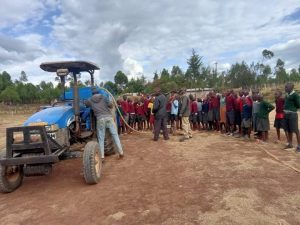
Dorcas Kumutia’s students watch as the water truck pumps water into their school barrels
“We need clean water in the school,” she said, standing near a large barrel made to catch rainwater. Due to an intense drought in Kenya and nearby African countries, Kenya has been very dry lately, so the barrel has been empty for a long time.
“It pains my heart every morning that the kids have to try and find their own water and then carry it to school every morning,” she said.
After hearing her request, Studies Weekly paid for a water truck to regularly come and fill their barrels. The students stayed that day until the truck came at 7 p.m., just so they could have water to bring home.
“The kids, they were cheering about this,” Kimutia said.
Students also took a moment during the phone interview with Studies Weekly to thank the company for sending a chalkboard, volleyball net, crayons, paper, and chocolate. Kimutia explained that none of the teachers or students had ever tasted chocolate before.
“It brought such joy to our school,” Kimutia laughed.
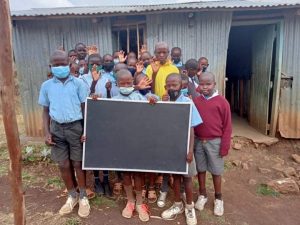
Dorcas Kumutia’s students pose with their new chalkboard.
Studies Weekly also provided a photocopier and laptop for the school. Kimutia said the laptop has opened up a whole new world to her and her students. Now she can access lessons from the Kenya Education Cloud, and show students actual pictures to explain concepts, like the difference between a cockroach and a cricket.
“It has brought a lot of fun to our learning,” she said.
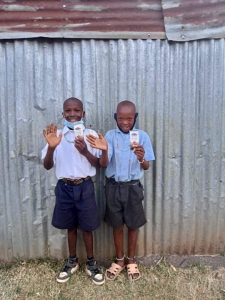
Dorcas Kumutia’s students pose with their chocolate.
Someday, Kimutia hopes funding will come in to help them install windows, doors and electricity for the school, and provide for a regular feeding program for the students. Until then, she and her students do the best they can with what they have, often with beautiful wide smiles lighting up their faces.
“It is easy to see that she is the epitome of ‘a teacher’s heart,’ caring far beyond just academics, but also for the whole child and their welfare and needs,” Bagley said.
